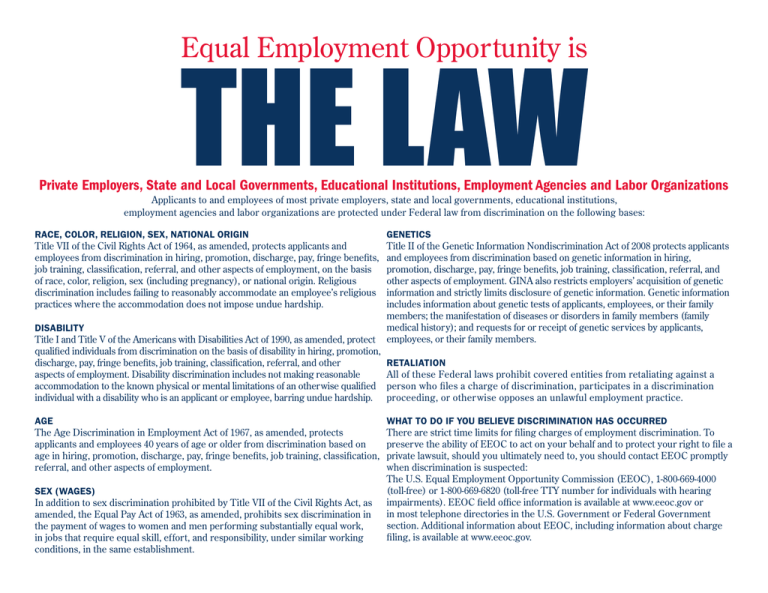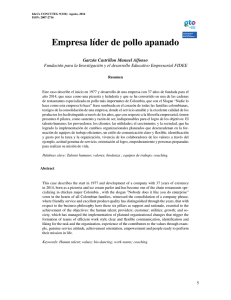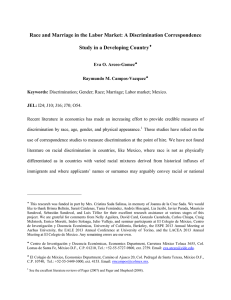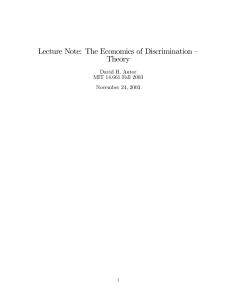Equal Employment Opportunity is
Anuncio

THE LAW Equal Employment Opportunity is Private Employers, State and Local Governments, Educational Institutions, Employment Agencies and Labor Organizations � Applicants to and employees of most private employers, state and local governments, educational institutions, employment agencies and labor organizations are protected under Federal law from discrimination on the following bases: � RACE, COLOR, RELIGION, SEX, NATIONAL ORIGIN Title VII of the Civil Rights Act of 1964, as amended, protects applicants and employees from discrimination in hiring, promotion, discharge, pay, fringe benefits, job training, classification, referral, and other aspects of employment, on the basis of race, color, religion, sex (including pregnancy), or national origin. Religious discrimination includes failing to reasonably accommodate an employee’s religious practices where the accommodation does not impose undue hardship. DISABILITY Title I and Title V of the Americans with Disabilities Act of 1990, as amended, protect qualified individuals from discrimination on the basis of disability in hiring, promotion, discharge, pay, fringe benefits, job training, classification, referral, and other aspects of employment. Disability discrimination includes not making reasonable accommodation to the known physical or mental limitations of an otherwise qualified individual with a disability who is an applicant or employee, barring undue hardship. AGE The Age Discrimination in Employment Act of 1967, as amended, protects applicants and employees 40 years of age or older from discrimination based on age in hiring, promotion, discharge, pay, fringe benefits, job training, classification, referral, and other aspects of employment. SEX (WAGES) In addition to sex discrimination prohibited by Title VII of the Civil Rights Act, as amended, the Equal Pay Act of 1963, as amended, prohibits sex discrimination in the payment of wages to women and men performing substantially equal work, in jobs that require equal skill, effort, and responsibility, under similar working conditions, in the same establishment. GENETICS Title II of the Genetic Information Nondiscrimination Act of 2008 protects applicants and employees from discrimination based on genetic information in hiring, promotion, discharge, pay, fringe benefits, job training, classification, referral, and other aspects of employment. GINA also restricts employers’ acquisition of genetic information and strictly limits disclosure of genetic information. Genetic information includes information about genetic tests of applicants, employees, or their family members; the manifestation of diseases or disorders in family members (family medical history); and requests for or receipt of genetic services by applicants, employees, or their family members. RETALIATION All of these Federal laws prohibit covered entities from retaliating against a person who files a charge of discrimination, participates in a discrimination proceeding, or other wise opposes an unlawful employment practice. WHAT TO DO IF YOU BELIEVE DISCRIMINATION HAS OCCURRED There are strict time limits for filing charges of employment discrimination. To preserve the ability of EEOC to act on your behalf and to protect your right to file a private lawsuit, should you ultimately need to, you should contact EEOC promptly when discrimination is suspected: The U.S. Equal Employment Opportunity Commission (EEOC), 1-800-669-4000 (toll-free) or 1-800-669-6820 (toll-free TTY number for individuals with hearing impairments). EEOC field office information is available at www.eeoc.gov or in most telephone directories in the U.S. Government or Federal Government section. Additional information about EEOC, including information about charge filing, is available at www.eeoc.gov. Employers Holding Federal Contracts or Subcontracts Applicants to and employees of companies with a Federal government contract or subcontract are protected under Federal law from discrimination on the following bases: RACE, COLOR, RELIGION, SEX, NATIONAL ORIGIN Executive Order 11246, as amended, prohibits job discrimination on the basis of race, color, religion, sex or national origin, and requires affirmative action to ensure equality of opportunity in all aspects of employment. INDIVIDUALS WITH DISABILITIES Section 503 of the Rehabilitation Act of 1973, as amended, protects qualified individuals from discrimination on the basis of disability in hiring, promotion, discharge, pay, fringe benefits, job training, classification, referral, and other aspects of employment. Disability discrimination includes not making reasonable accommodation to the known physical or mental limitations of an otherwise qualified individual with a disability who is an applicant or employee, barring undue hardship. Section 503 also requires that Federal contractors take affirmative action to employ and advance in employment qualified individuals with disabilities at all levels of employment, including the executive level. DISABLED, RECENTLY SEPARATED, OTHER PROTECTED, AND ARMED FORCES SERVICE MEDAL VETERANS The Vietnam Era Veterans’ Readjustment Assistance Act of 1974, as amended, 38 U.S.C. 4212, prohibits job discrimination and requires affirmative action to employ and advance in employment disabled veterans, recently separated veterans (within three years of discharge or release from active duty), other protected veterans (veterans who served during a war or in a campaign or expedition for which a campaign badge has been authorized), and Armed Forces service medal veterans (veterans who, while on active duty, participated in a U.S. military operation for which an Armed Forces service medal was awarded). RETALIATION Retaliation is prohibited against a person who files a complaint of discrimination, participates in an OFCCP proceeding, or otherwise opposes discrimination under these Federal laws. Any person who believes a contractor has violated its nondiscrimination or affirmative action obligations under the authorities above should contact immediately: The Office of Federal Contract Compliance Programs (OFCCP), U.S. Department of Labor, 200 Constitution Avenue, N.W., Washington, D.C. 20210, 1-800-397-6251 (toll-free) or (202) 693-1337 (TTY). OFCCP may also be contacted by e-mail at OFCCP-Public@dol.gov, or by calling an OFCCP regional or district office, listed in most telephone directories under U.S. Government, Department of Labor. Programs or Activities Receiving Federal Financial Assistance RACE, COLOR, NATIONAL ORIGIN, SEX In addition to the protections of Title VII of the Civil Rights Act of 1964, as amended, Title VI of the Civil Rights Act of 1964, as amended, prohibits discrimination on the basis of race, color or national origin in programs or activities receiving Federal financial assistance. Employment discrimination is covered by Title VI if the primary objective of the financial assistance is provision of employment, or where employment discrimination causes or may cause discrimination in providing services under such programs. Title IX of the Education Amendments of 1972 prohibits employment discrimination on the basis of sex in educational programs or activities which receive Federal financial assistance. EEOC 9/02 and OFCCP 8/08 Versions Useable With 11/09 Supplement INDIVIDUALS WITH DISABILITIES Section 504 of the Rehabilitation Act of 1973, as amended, prohibits employment discrimination on the basis of disability in any program or activity which receives Federal financial assistance. Discrimination is prohibited in all aspects of employment against persons with disabilities who, with or without reasonable accommodation, can perform the essential functions of the job. If you believe you have been discriminated against in a program of any institution which receives Federal financial assistance, you should immediately contact the Federal agency providing such assistance. EEOC-P/E-1 (Revised 11/09) “EEO is the Law” Poster Supplement Employers Holding Federal Contracts or Subcontracts Section Revisions The Executive Order 11246 section is revised as follows: RACE, COLOR, RELIGION, SEX, SEXUAL ORIENTATION, GENDER IDENTITY, NATIONAL ORIGIN Executive Order 11246, as amended, prohibits employment discrimination based on race, color, religion, sex, sexual orientation, gender identity, or national origin, and requires affirmative action to ensure equality of opportunity in all aspects of employment. PAY SECRECY Executive Order 11246, as amended, protects applicants and employees from discrimination based on inquiring about, disclosing, or discussing their compensation or the compensation of other applicants or employees. The Individuals with Disabilities section is revised as follows: INDIVIDUALS WITH DISABILITIES Section 503 of the Rehabilitation Act of 1973, as amended, protects qualified individuals with disabilities from discrimination in hiring, promotion, discharge, pay, fringe benefits, job training, classification, referral, and other aspects of employment. Disability discrimination includes not making reasonable accommodation to the known physical or mental limitations of an otherwise qualified individual with a disability who is an applicant or employee, barring undue hardship to the employer. Section 503 also requires that Federal contractors take affirmative action to employ and advance in employment qualified individuals with disabilities at all levels of employment, including the executive level. The Vietnam Era, Special Disabled Veterans section is revised as follows: PROTECTED VETERANS The Vietnam Era Veterans’ Readjustment Assistance Act of 1974, as amended, 38 U.S.C. 4212, prohibits employment discrimination against, and requires affirmative action to recruit, employ, and advance in employment, disabled veterans, recently separated veterans (i.e., within three years of discharge or release from active duty), active duty wartime or campaign badge veterans, or Armed Forces service medal veterans. Mandatory Supplement to EEOC P/E-1(Revised 11/09) “EEO is the Law” Poster. If you believe that you have experienced discrimination contact OFCCP: 1-800-397-6251 | TTY 1-877-889-5627 | www.dol.gov. PAY TRANSPARENCY NONDISCRIMINATION PROVISION The contractor will not discharge or in any other manner discriminate against employees or applicants because they have inquired about, discussed, or disclosed their own pay or the pay of another employee or applicant. However, employees who have access to the compensation information of other employees or applicants as a part of their essential job functions cannot disclose the pay of other employees or applicants to individuals who do not otherwise have access to compensation information, unless the disclosure is (a) in response to a formal complaint or charge, (b) in furtherance of an investigation, proceeding, hearing, or action, including an investigation conducted by the employer, or (c) consistent with the contractor’s legal duty to furnish information. If you believe that you have experienced discrimination contact OFCCP 1.800.397.6251 | TTY 1.877.889.5627 | www.dol.gov/ofccp 200 CONSTITUTION AVENUE NW WASHINGTON, DC 20210 tel: 1-800-397-6251 TTY: 1-877-889-5627 www.dol.gov/ofccp LFD26 Print Date: 11/13 IF YOU HAVE THE RIGHT TO WORK, Don’t let anyone take it away. If you have the legal right to work in the United States, there are laws to protect you against discrimination in the workplace. You should know that – In most cases, employers cannot deny you a job or fire you because of your national origin or citizenship status or refuse to accept your legally acceptable documents. Employers cannot reject documents because they have a future expiration date. Employers cannot terminate you because of E-Verify without giving you an opportunity to resolve the problem. In most cases, employers cannot require you to be a U.S. citizen or a lawful permanent resident. If any of these things have happened to you, contact the Office of Special Counsel (OSC). For assistance in your own language: Phone: 1-800-255-7688 or (202) 616-5594 For the hearing impaired: TTY 1-800-237-2515 or (202) 616-5525 U.S. Department of Justice Civil Rights Division Office of Special Counsel for Immigration-Related Unfair Employment Practices E-mail: osccrt@usdoj.gov Or write to: U.S. Department of Justice – CRT Office of Special Counsel – NYA 950 Pennsylvania Ave., NW Washington, DC 20530 www.justice.gov/crt/about/osc Esta organización participa en E-Verify Este empleador proporcionará a la Administración del Seguro Social (SSA, por sus siglas en inglés) y, de ser necesario, al Departamento de Seguridad Nacional (DHS, por sus siglas en inglés) la información incluida en el Formulario I-9 de todo empleado nuevo con el propósito de confirmar su autorización de trabajo. IMPORTANTE: Si el gobierno no puede confirmar que usted tiene autorización para trabajar, el empleador debe suministrarle las instrucciones por escrito y darle la oportunidad de ponerse en contacto con DHS o SSA antes de sancionarlo de cualquier forma o finalizar la relación laboral. Los empleadores no pueden utilizar E-Verify para realizar preselecciones de solicitantes y no pueden limitar ni influenciar la selección de los documentos que usted presente para su inclusión en el Formulario I-9. E-Verify funciona para todos Para obtener más información sobre E-Verify, comuníquese con DHS al: Para determinar si los documentos incluidos en el Formulario I-9 son válidos, este empleador utiliza la técnica de comparación fotográfica para comparar la fotografía que aparece en las Tarjetas de Residente Permanente, Tarjetas de Autorización de Empleo y pasaportes de los EE. UU. con la fotografía oficial del gobierno de los EE. UU. Asimismo, E-Verify verifica los datos incluidos en licencias de conducir y tarjetas de identificación emitidas por algunos estados. Si considera que su empleador ha infringido sus responsabilidades en virtud de este programa o lo ha discriminado durante el proceso de verificación de la elegibilidad de empleo por su origen nacional o estatus de ciudadanía, comuníquese con la Oficina del Consejero Especial llamando al 800-255-7688, 800-237-2515 (para personas con impedimentos auditivos) o visitando www.justice.gov/crt/osc. A V I S O: La ley federal exige a todos los empleadores que verifiquen la identidad y la elegibilidad de empleo de todas las personas contratadas en los Estados Unidos. 888-897-7781 www.dhs.gov/E-Verify El logotipo y la marca de E-Verify son marcas registradas del Departamento de Seguridad Nacional. Queda estrictamente prohibida la venta comercial de este afiche. SI USTED TIENE DERECHO A TRABAJAR, no deje que nadie se lo quite. Si usted tiene el derecho a trabajar legalmente en los Estados Unidos, existen leyes que lo protege contra la discriminación en el trabajo. Usted debe saber que: En la mayoría de los casos, los empleadores no pueden negarle un empleo o despedirlo debido a su origen nacional o estatus migratorio o negarse a aceptar sus documentos válidos y legales. Los empleadores no pueden rechazar documentos porque tienen una fecha de vencimiento futura. Los empleadores no pueden despedirlo debido a E-Verify sin darle una oportunidad de resolver el problema. En la mayoría de los casos, los empleadores no pueden exigir que usted sea ciudadano estadounidense o residente legal permanente. Si alguna de estas cosas le ha sucedido, contacte a la Oficina del Consejero Especial (OSC, por sus siglas en inglés). Para ayuda en su propio idioma: Teléfono: 1-800-255-7688 o 202-616-5594 Para las personas con discapacidad auditiva: TTY 1-800-237-2515 o 202-616-5525 Departamento de Justicia de EE.UU. División de Derechos Civiles Oficina del Consejero Especial Para Prácticas Injustas en el Empleo Relacionadas a Inmigración E-mail: osccrt@usdoj.gov O escriba a: U.S. Department of Justice - CRT Office of Special Counsel- NYA 950 Pennsylvania Avenue, NW Washington, DC 20530 www.justice.gov/crt/about/osc









